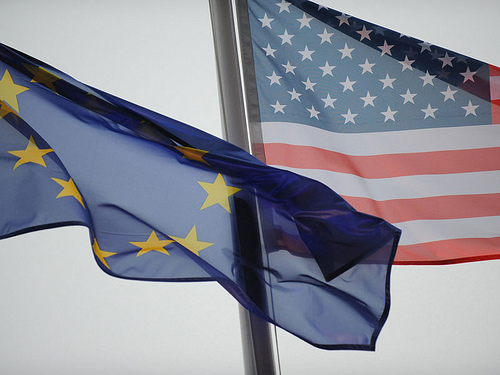
The EU reinstates its visa ban on Belarusian President Lukashenko’s regime, Belgium’s political crisis deepens, and Italian Prime Minister Berlusconi faces increased pressure to resign in the face of new scandal details.
HEADLINES:
New setback in Belgium’s crisis as king’s envoy resigns (AFP)
Belgium’s longest political crisis in history hit a new setback Wednesday when King Albert II’s mediator threw in the towel after failing to break a deadlock between Dutch and French-speaking leaders.
Johan Vande Lanotte "asked the king to be discharged from his mission. The king accepted and will start consultations tomorrow," the palace said.
EU calls for restraint as Egypt revolt unfolds (EurActiv)
EU foreign affairs chief Catherine Ashton called today (27 January) on the Egyptian authorities to exercise restraint after street violence escalated. Prominent Egyptian reform campaigner Mohamed ElBaradei said he was ready to assume power in Egypt if the people called for him to do so.
Alexander Lukashenko to be banned from EU (The Guardian)
The European Union will reinstate a visa ban on President Aleksander Lukashenko and other officials in Belarus next week in response to his crackdown on protests after a disputed December election, EU diplomats said.
Turkey’s growing ties with Arab world (BBC News)
On 10 January, before an audience of eminent Islamic scholars in Kuwait City, Turkish Prime Minister Recep Tayyip Erdogan was awarded the "Outstanding Personality in the Muslim World" prize. The moment perfectly captured Turkey’s growing popularity in the Arab world under Mr. Erdogan’s mildly Islamist Justice and Development (AK) party government that shot to power in 2002.
Cypriot leaders meet Ban, target March in talks (Today’s Zaman)
Greek and Turkish Cypriot leaders sat down with UN Secretary-General Ban Ki-moon on Wednesday to discuss ways to end the conflict on their divided island, though no major breakthrough is expected until at least March.
Transniestrian people stake their future on Russia, not EU (EUObserver)
The 350,000-or-so people living in political limbo in Transniestria, the private fiefdom of a Russian businessman on the EU’s eastern fringe, want to integrate with Russia despite a new wave of euro-optimism on the other side of its unofficial border with Moldova. But their views are shaped by decades of repression.
Ever since it split from Moldova in the early 1990s, the official policy of the "Pridnestrovian Moldavian Republic" is that it wants to be recognised as an independent country and then to become part of Russia.
Ruling Irish party names new leader at end of power struggle (Deutsche Welle)
Ireland’s ruling Fianna Fail party elected former Foreign Minister Micheal Martin its new leader, the party said in a Twitter message on Wednesday. The vote seemed to resolve a power struggle within center-right Fianna Fail that has gone on as Prime Minister Brian Cowen’s government has crumbled.
Cowen is still Ireland’s prime minister, and he won a vote of confidence that Fianna Fail held last week. But he stepped down from the party’s leadership as support for his governing coalition collapsed, with the Green Party withdrawing from of the alliance on Sunday.
Medvedev: Russia is open for business (The Independent)
Dmitry Medvedev, the President of Russia, last night set out his country’s stall in an attempt to attract international investment, vowing to fight to "eradicate the terrorism" his country has repeatedly suffered.
Speaking to the World Economic Forum in Davos, Switzerland, Mr Medvedev unveiled a series of reforms and initiatives he said he hoped would prompt investors to flock to Russia, while also chiding Western countries for their failures during the financial crisis and subsequently.
EDITORIALS AND COLUMNS:
Buy euros – the single currency is finished (The Telegraph)
The debt bill is too high for the Club Med nations and they will have to leave the zone, says Jeff Randall.
Berlusconi’s Worst Nightmare (Foreign Policy)
Last week, the Italian magazine Panorama published a huge photo of Ilda Boccassini, Milan’s 61 year-old public prosecutor, on its front cover under the title "Il Vizietto," the Little Vice. The vice in question was not that of the magazine’s owner, Silvio Berlusconi, who is the current and long-time object of Boccassini’s investigatory ardor. The misbehavior that the magazine intended to highlight was the magistrate’s own — namely, her relentless persecution of the Italian prime minister. Indeed, in seeking an indictment of Berlusconi for the better part of the past two decades, Boccassini has herself become a defendant in Italy’s court of public opinion.
The Kremlin’s Bold Missile Defense Gambit (The Moscow Times)
year ago, General Staff chief Nikolai Makarov railed against the revamped European missile defense plan proposed by the administration of U.S. President Barack Obama. Makarov claimed that “the development and deployment of missile defenses is aimed against the Russian Federation” and “without question weakens our potential nuclear deterrent.” Yet on Wednesday, Makarov visited NATO headquarters in Brussels for Russian-initiated discussions on the development of joint NATO-Russian missile defenses. Moscow’s proposal is presumably based in part on the very system — the Obama administration’s so-called phased adaptive approach — that Makarov once lambasted.
So why Russia’s sudden change of heart?
Compiled with the assistance of Elyse Newman.
Image: transatlantic.jpg
